#gendered language
Text
We ask your questions so you don’t have to! Submit your questions to have them posted anonymously as polls.
#polls#incognito polls#anonymous#tumblr polls#tumblr users#questions#polls about language#submitted june 9#gender#language#gendered language
759 notes
·
View notes
Text
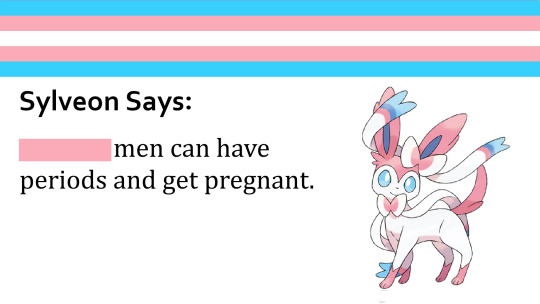
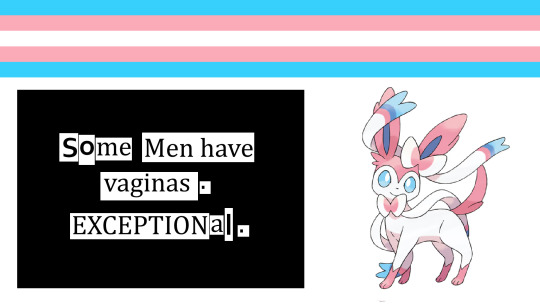
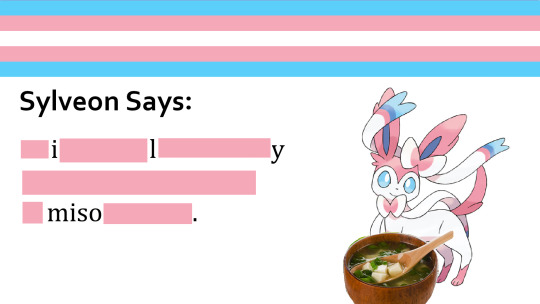
sylveon for trans rights and miso soup also
Submitted by @legateamelia
#fixingbadposts#fixing-bad-posts#fbp submission#legateamelia#sylveon#trans rights#transgender#transgender rights#queer#gendered language
7K notes
·
View notes
Text
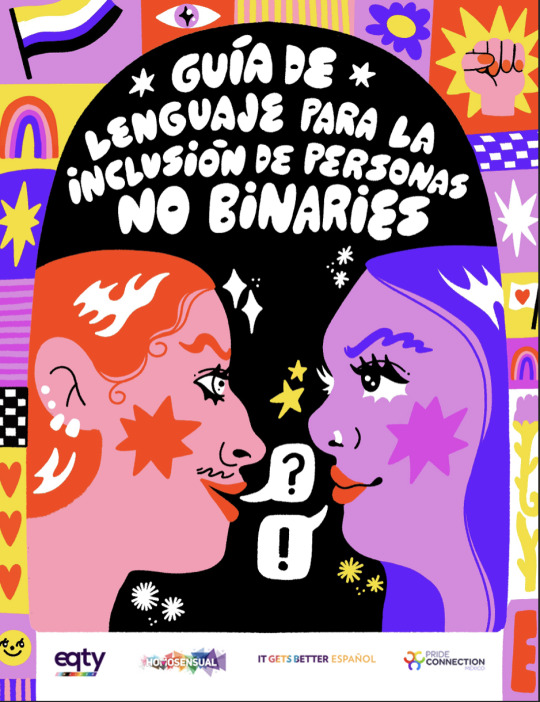
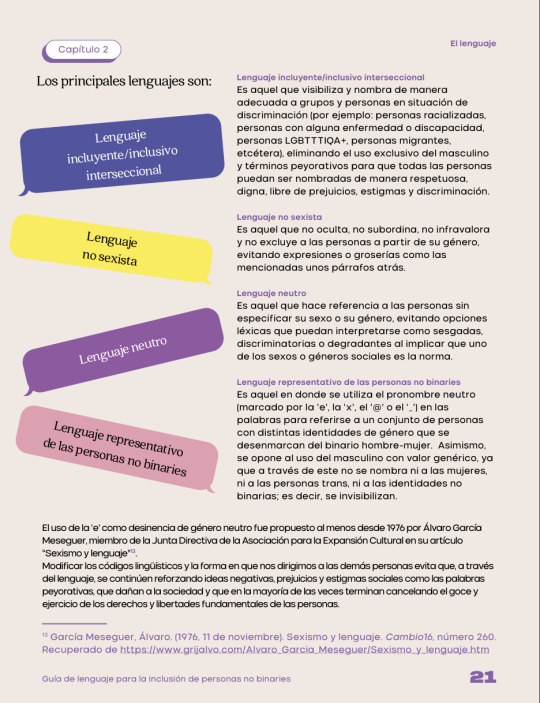
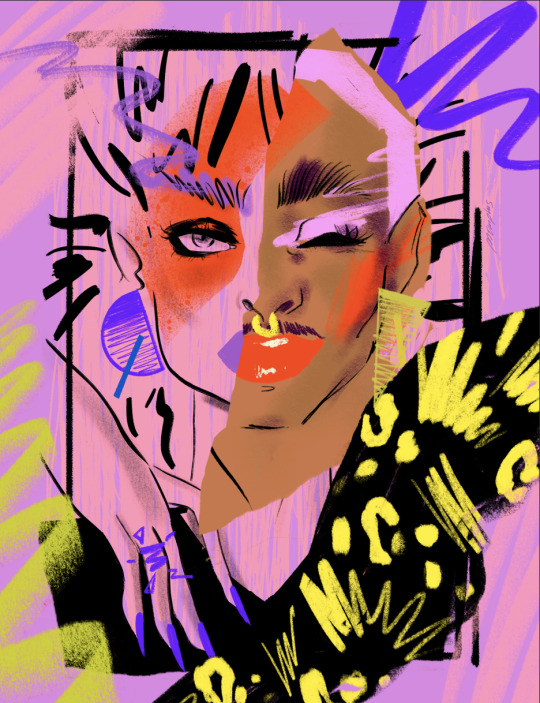
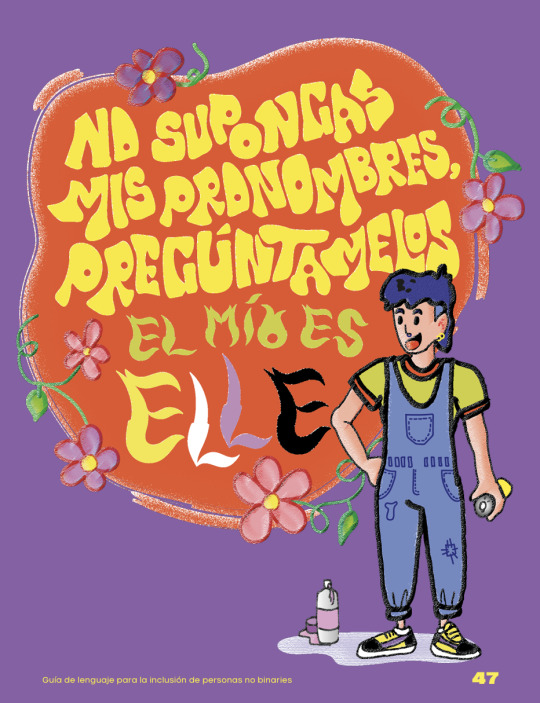
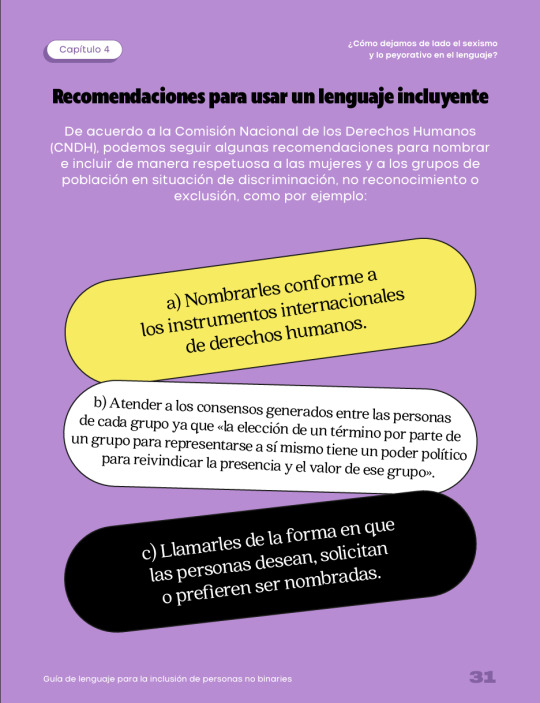
FREE downloadable guide to nonbinary language in Spanish - spread the word! 💛🤍💜🖤
How do we take a traditionally gendered language like Spanish and adapt it to be more gender inclusive?
Language is a powerful tool - this new EduGuide is amplifying non-binary voices, dismantling stigmas, and teaching us how to take a traditionally gendered language and adapt it to be more inclusive.
Our pals at It Gets Better Mexico collaborated with Homosensual to address this crucial issue within the language — download their guide for FREE and share it around to friends, family, your school, and your community: itgetsbetter.org/blog/spanish-eduguide-for-the-inclusion-of-nonbinary-people
Education like this helps create a space where every identity is seen and celebrated!
---------
El lenguaje es una herramienta poderosa - esta nueva EduGuide amplifica las voces no binaries, desmantela los estigmas y nos enseña cómo tomar un lenguaje tradicionalmente basado en género y adaptarlo para que sea más inclusivo.
Nuestres amigis de It Gets Better México colaboraron con Homosensual para abordar este tema crucial dentro del idioma — descarga tú guía GRATIS y compártala con amigues, familiares, tú escuela y tú comunidad para participar en estas importantes conversations: itgetsbetter.org/blog/spanish-eduguide-for-the-inclusion-of-nonbinary-people
¡Una educación como esta ayuda a crear un espacio donde se ve y se celebra cada identidad!
#itgetsbetter#homosensual#nonbinary#enby#genderqueer#gender neutral#gendered language#pronouns#spanish language#no binario#no binarie#latine#lgbtqia
5K notes
·
View notes
Text
There is one big issue with gender neutral language in English for nonbinary etc people like myself.
Titles/Honorifics
It's one that's had a lot of debate and many proposed solutions over the years (including Mx. which works for some people but I find clumsy), but I think I've solved it with the help of etymology and Wikipedia
Mr. and Mrs. are both from Master and mistress, and if you trace them back they go to Magister, and then to Magis
Which is related to both Mage, and Maestro, and means roughly the same things as Mister and Mistress
So I suggest (and really enjoy the idea of) perhaps adding Mgs. to Mr. and Mrs., pronounced "Magis"
Which could be used in a spousal way and as a title of respect
When I tried to do similar things for Sir and Ma'am, they come from different roots and so I can't quite as easily do this tracing back and abbreviating, but I am attempting it anyway. (I will update if I find anything worthwhile)
I get not many people are willing or able to change their language in such a forced way like this, and that language is supposed to evolve fluidly forward and not by haltingly filling in gaps left by the gender binary we already have built in to English, but I wonder if Mgs. would catch on...
(Also Mgs. [My last name] sounds reallllllly cool, try it out)
#Mr and Mrs#formal titles#language#nonbinary#Magis#Mgs#genderqueer#genderfluid#agender#transgender#mx#gendered language#hmm#etymology#gender neutral terms#gender neutral titles
474 notes
·
View notes
Text
LMAO I NEED TO SHARE THIS WITH YOU GUYS
our new literature teacher started her intro with neutral language like "good morning everyone (masculine form), everyone (feminine form) and everyone (neutral form)" which is a pretty big deal in our language and now all the stupids are mad at her for some reason.
THEY WENT TO THE COUNSELORS OFFICE REPORT HER FOR THAT. i am fucking dying.
THEIR WORDS, NOT MINE: "BRO THIS IS A qualified teacher that went through years of studying shouldn't she know better?!!!!!1!1!1!!" "i told my dad about this and he said he's gonna transfer me out of school"
#laughing just so i dont cry btw#lgbt#lgbtq#lgbtqia#nonbinary#non binary#enby#nb#trans#transgender#gendered language
74 notes
·
View notes
Text
Why do we call agab agab. It's sex assigned at birth. Not gender. It would be dif if it was Amab and Awab for assigned man and woman at birth or abab and agab for boy and girl, because those are genders, but this is assigned sex at birth. So why isn't it asab. Hm.
Maybe it's an example of the trans community still having this weird idea that sex = gender that they haven't unpacked fully outside of validating nonbinary perisex people. Or it could just be an honest overlook. Either way.
#agab#assigned gender at birth#gendered language#transgender#transblr#intersex#actually intersex#transphobia#intersexism
35 notes
·
View notes
Text
“My use of their is socially motivated and, if you like, politically correct: a deliberate response to the socially and politically significant banning of our genderless pronoun by language legislators enforcing the notion that the male sex is the only one that counts. I consistently break a rule I consider to be not only fake but pernicious. I know what I’m doing and why.”
—Ursula K. Le Guin, from Steering the Craft: A Twenty-First-Century Guide to Sailing the Sea of Story
41 notes
·
View notes
Note
I've been debating whether I'm agender for a while now, and I think yeah, somehow I am, but also not quite. It's more like... I don't care? I am biologically female. That's fine, that's all I've ever known, but it's not part of my identity.
The best metaphor I could come up with is like it's an old sweater that I've owned for ages, and it's maybe not the prettiest or the comfiest but it's there and I've always worn it so it's fine. Sure, sometimes it looks a bit off. I could embrace it, make a whole look. But then people might take notice that I'm wearing a sweater and that would be weird, because I'm not wearing it for any particular reason other than 'it's there' and people might compliment it which would be super uncomfortable because it's just an old sweater? Haven't we all got one? Sure, maybe it would be nice to wear a jacket instead from time to time, jackets are cool, but I don't care enough about jackets either to put in the effort. So I'll keep wearing my sweater, because that's what I've always done and if someone calls me 'the person with the sweater' that's fine too, because even though it doesn't really resonate with me, on the surface it's true.
It's weird, because I don't feel like a woman, but I'm so used to being seen as a woman and most of the time it's not uncomfortable enough that I feel like I have to change that perception of me. Sometimes I wonder if I would be happier as not-a-woman, but that concept is so nebulous that I can't really imagine it. I don't know. Sorry for the rambling, but it's hard to put into words and I am kinda curious if there are other people out there feeling similarly? Maybe someone even invented a word for it already?
I don't personally feel like that, but hopefully you find someone who can relate. Good luck!
#agender#our agender experience#agender pride#have a nice day#gender presentation#gendered language#pronouns
56 notes
·
View notes
Text
I was thinking about this, I always considered "bitch" gender-neutral and didn't really realize it was meant to be a gender-exclusive means of degradation. Which is odd because its neighboring insults "son of a bitch" and "bastard" are still in my mind more exclusively masculine. But I do have weird views on gender and was mostly raised around women so maybe that affected my view on it
#poll time#tumblr polls#polls#random polls#linguistics#language poll#word poll#sociology#gender#gendered language
22 notes
·
View notes
Note
Bonjour! Je voulais juste vous demander (et aussi demander vos abonnés) comment dire iel (où they) en allemand et en russe. Je suis en train d’apprendre les deux et comme j’utilise iel/they en français/anglais, je voulais vraiment savoir comment faire la même en allemand et en russe. Désolé si vous n’êtes pas qui je devais demander, je sais que c’est parfois très compliqué et parfois il y a beaucoup de réponses. Merci tellement!
Что такой “they” (местоимение) по русский? Я изучаю русский язык и я хочу знать. Это «они» или что-то другое? Спасибо!!
Ich möchte gern wissen wie sagt man „they“ auf Deutsch. Vielen Dank!
(ask from spyld 2023)
Nice question!! So I'm throwing it open to other languages too!
How to be gender neutral in x language??
#nonbinary language#nonbinary#spyld posts#genderqueer#non binary#spyld#enby#gendered language#language#german#russian#french#love for iel en français btw :)
84 notes
·
View notes
Text
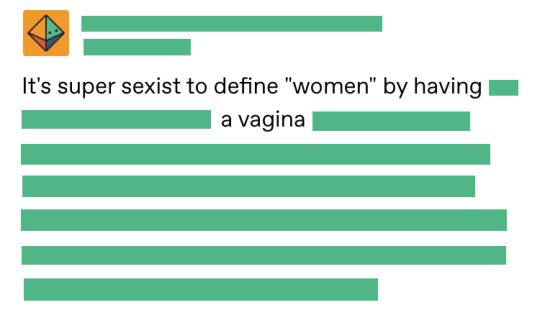
It's super sexist to define "women" by having a vagina
3K notes
·
View notes
Text
If you see the post going around with this meme, it's just very blatantly fucking exorsexist and misogynistic. Non-binary people and feminists in languages with gendered grammar have been fighting for decades for gender-neutral language.
This shitty bigoted argument that is infantilizing everyone who has a problem with male default language (which is almost always the fucking default for a goddamn reason), is just pretending that these people don't understand how their own fucking languages work and is pretending that male default language and enforced gender binary language is just perfectly normal and doesn't have anything to do with your actual gender, despite all of the people who speak these languages that have been fighting against it for decades.
Do not fucking listen to any of the people insisting that you don't need gender neutral language. They are completely fucking ignoring and erasing the people who have been fighting for gender-neutral language for decades. Since before the fucking internet.
Feminists and non-binary people in heavily gendered languages are not just ignorant of how their own fucking languages work. Arguments and memes like this are literally just fucking bigotry.
Imagine if this just said something is fucking useless as "they don't know that they is only plural and can't be used for a single entity" or something else like that.
It's just blatant fucking bigotry and purposefully ignoring and now infantilizing all of the people who have been fighting for gender neutral language in their own languages.
Do not fucking fall for this shit. The people who speak these languages who are unhappy with the gender grammar are not just ignorant of how the fucking language they've literally grown up speaking works.

[ID: Meme drawing of four people socialising and enjoying a party while another stands in the corner watching and holding a cup. Text next to this other person reads: "They don't know gender in languages is just a grammatical category that can be related to but is not the same as human gender identities"]
This literally wants you to think of anyone who has a problem with gendered grammar is just fucking ignorant and doesn't understand how their own language works, and is getting upset and "causing problems" for no reason. It is extra sexist it is misogynistic it is just pure fucking bigotry and vandalizing the people fighting for equality and recognition.
It also wants you to assume that the only people who are upset by gendered grammar are outsiders who don't speak the language so that you can easily dismiss them as not actually worthy of consideration or respect, the way everybody still pretends that Latinx was created by fucking white people as a slur despite the fact that it was literally created by people who self-identified as Latinx in order to fight back against male default language and binary default language.
Anytime you see somebody arguing against the need for gender-neutral language by insisting that the current setup is perfectly fine and no one who really matters has a problem with it, it's bigotry.
This would be the equivalent of somebody trying to imply that the only people who want the existence of singular they then pronouns is people who don't actually speak English and just don't understand how it works. To erase all of the people who use they them pronouns in English. That's literally what this is.
#Exorsexism#Misogyny#Male default language#Gendered language#Gendered grammar#Transmisia#Feminism#Transfeminism#Nonbinarism#Described images
15 notes
·
View notes
Text
it's so weird and irritating how certain descriptors are close to fitting, but they're not quite there
they are so close! to how i want to be called or described, but they're just... not... how i want to be called or described
so,
shoutout to those who don't feel described by mr, ms or even mx
shoutout to those who don't feel described by woman, man, enby, any of the sort
shoutout to those who don't feel described by boyfriend, girlfriend, partner, etc
shoutout to those who don't feel described by cute, pretty, beautiful, handsome, the list goes on
and to those who feel iffy or uncomfortable by those terms, especially those who feel they have no other choice but to go by them
i see you, i understand. <3 i'm always welcome to and hoping to hear some new or different terms :)
#trans#nonbinary#genderqueer#gendered language#gender term#descriptors#compliments#honorifics#i don't even know how to tag this#think this is just my nb otherkin experience tbh#trans experience#nonbinary experience#genderqueer experience#queer#lgbtq#gender neutral#gender neutral terms
31 notes
·
View notes
Text
Burmese/Myanmar 1st Person Pronouns
Talking about burmese yet AGAIN. I promise I'm not a nationalist, it is just a deeply interesting language and no one else is talking about it.
Let's talk pronouns. Burmese is a status-centered language. Who you are and what you do is incredibly important in conversations. I'm here to talk about first person pronouns. (btw if you're a mandarin chinese speaker, these rules might be very familiar to you!)
Equivalent of "I" (1st person singular pronoun)
ငါ (ngar) - informal. Used only for friends or people younger than the speaker. Incredibly rude to refer to yourself like this to older people or strangers.
ကျွန်တော် (kya-naw) - formal. Mostly used by men or masculine people but it was very commonly used by women from Mandalay or upper Myanmar. Now women from other regions use it as well. Age of the person you're speaking to does not matter but it is implied that the speaker thinks you're older or deserving of respect.
ကျွန်မ (kya-ma) - formal. Used by women or feminine people. Queer men or effeminate men will use this ironically or sincerely. Age of the person you're speaking to does not matter but it is implied that the speaker thinks you're older or deserving of respect.
ကျုပ် (kyote) - formal. When used by older people, it's neutral but if it's used by people of your age or younger, it's only a little bit less rude than ငါ (ngar)
ကိုယ် (ko) - formal but intimate. It is a gender neutral pronoun but if you're a masculine person, it hints you really care about the other person and sometimes have romantic connotations. If you're a feminine person though, it is similar to အိုင် (I). This is pronounced the same as ကို (ko) which means older brother OR someone's male/masculine lover but it is not the same word.
အိုင် (I) - informal. Yes, the English word "I" has been adopted into the language but it is only used by women who are talking to people of their age or younger.
As you can see, masculine pronouns are actually also gender neutral pronouns.
Now, we're gonna talk about status-centred 1st person and 2nd person pronouns. Like I said, it is important to be aware of your own age and your status or occupation when you're conversing with someone. Burmese people will use family pronouns or their occupations to refer to themselves. And the person you're talking to will repeat the 1st person pronoun you used and also use it as the 2nd person pronoun during your conversation. The family pronouns can be used even on complete strangers. It's just a way to be polite.
သား (thar) and သမီး (tha-mee) - it means "son" or "daughter." သား (thar) or son is used by both masculine and feminine people but သမီး (thamee) or daughter is only used by women or feminine people. Instead of "I'll do that" they'll say "(this) son/daughter will do that." It is implied that the speaker things the other party is older than them, if not as old as their parents at least as old as their aunts or uncles.
Just like son and daughter, any role of a family member can be used here. You can call yourself many words including but not limited to
အမေ (amay - mom)
အဖေ (aphay - dad)
အန်တီ (aunty)
အန်ကယ် (uncle)
အစ်မ (ama - older sister)
အစ်ကို (ako - older brother)
ညီ/ညီလေး (nyi/nyi lay - younger brother)
ညီမ/ညီမလေး (nyima/nyima lay - younger sister) and so on. And yes, just like mandarin chinese, we do have words for uncle on mother's side or aunt on father's side et cetera but it's mostly in Upper Myanmar regions.
So then how does occupational 1st/2nd person pronouns work? It is exacty what you think it is. If you're a teacher or a mentor you use the word ဆရာ/ဆရာမ (sayar/sayarma - teacher (male)/(female) for yourself. တီချယ် (which is pronounced teacher and meand teacher) is a word solely reserved for female teachers and educators, and by that I mean school teachers. But ဆရာ/ဆရာမ (sayar/sayarma - teacher (male)/(female) can be used in any occupation as long as you're a mentor or a boss of the person you're speaking to. There are occupational and personal pronouns for monks/nuns as well.
So let's say you're going up to a stranger to ask for directions. You have to look at a person and decide how old you think they are, what gender you think they are and how polite you think you need to be before saying anything. Because you can be saying "older brother, (this) younger brother wants to know where x is" or "uncle, (this) niece wants to know where x is." As you might have guessed by now, it is easy to offend people in Burmese, intentionally or not.
And another feature of Burmese language: you can use your name or your nickname for yourself. It would be like speaking about yourself in 3rd person if you're in another language. Since my name is Helen, I can say "Helen's not hungry. Helen just ate" and it's completely normal. Although using your own name as a 1st person pronoun is a statement in itself. It is normally used by younger people talking to an older person.
I can go on and on about pronouns, especially the way it interacts with queer community at large. You can immediately get someone's personality by just hearing the pronouns they use for themselves in various settings. People will change their 1st person pronouns at a whim to better suit the situation at hand. It is amazing to see people code-switching pronouns in real time, and even more so when they come out. This is also why "pronouns are who you are" thing never made sense to me.
On a personal note, I use ကျွန်တော် (kya-naw) for myself on nearly all occasions except at home where I use my nickname instead. In English, my pronouns are they/them/he/him but in Burmese, my pronoun is simply my name. I always tell people to call me "Helen" instead of "You" or other gendered/status-oriented terms. Calling someone by their name is considered rude so people struggle with this a bit because they feel like they're being mean but I always insist on it because I don't wanna be called gendered pronouns.
#myanmar#burmese#burmese language#myanmar language#pronouns#1st person pronouns#gendered language#studyblr#langblr#long post#မြန်မာစာ#ဗမာစာ#မြန်မာစကား#ဗမာစကား#ramblings of a mad them#< too late. I'm actually coporating that tag into my language rn
15 notes
·
View notes
Note
How hard is it for people to grasp the concept of a language that's not gendered? (French into English as an example)
I can only speak for my own experience really, but... Personally I find it way easier, and I wouldn't be surprised if other people felt that way too! It's a lot more inclusive, removes some of the uncertainty and doesn't leave you wondering for hours about what random "gender" an inanimate object is supposed to be because someone randomly decided so (I swear to god we do that more often than one would think even in our own language)
49 notes
·
View notes
Text
8 notes
·
View notes